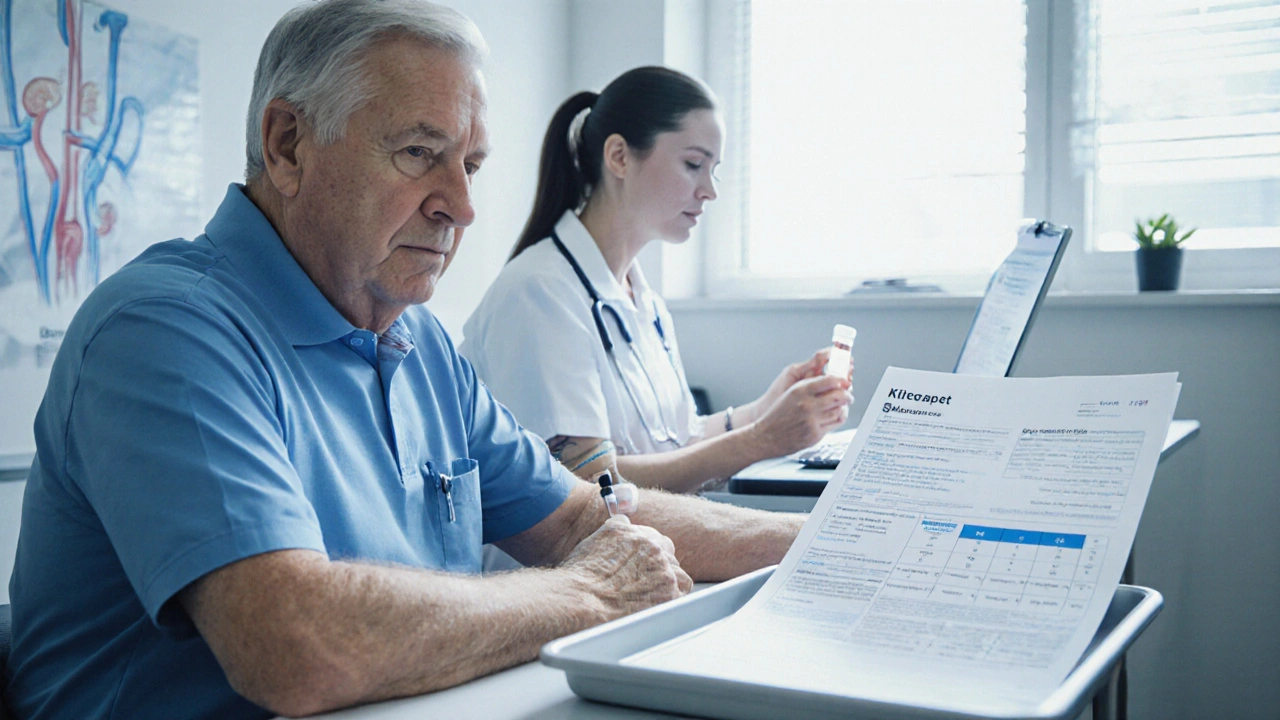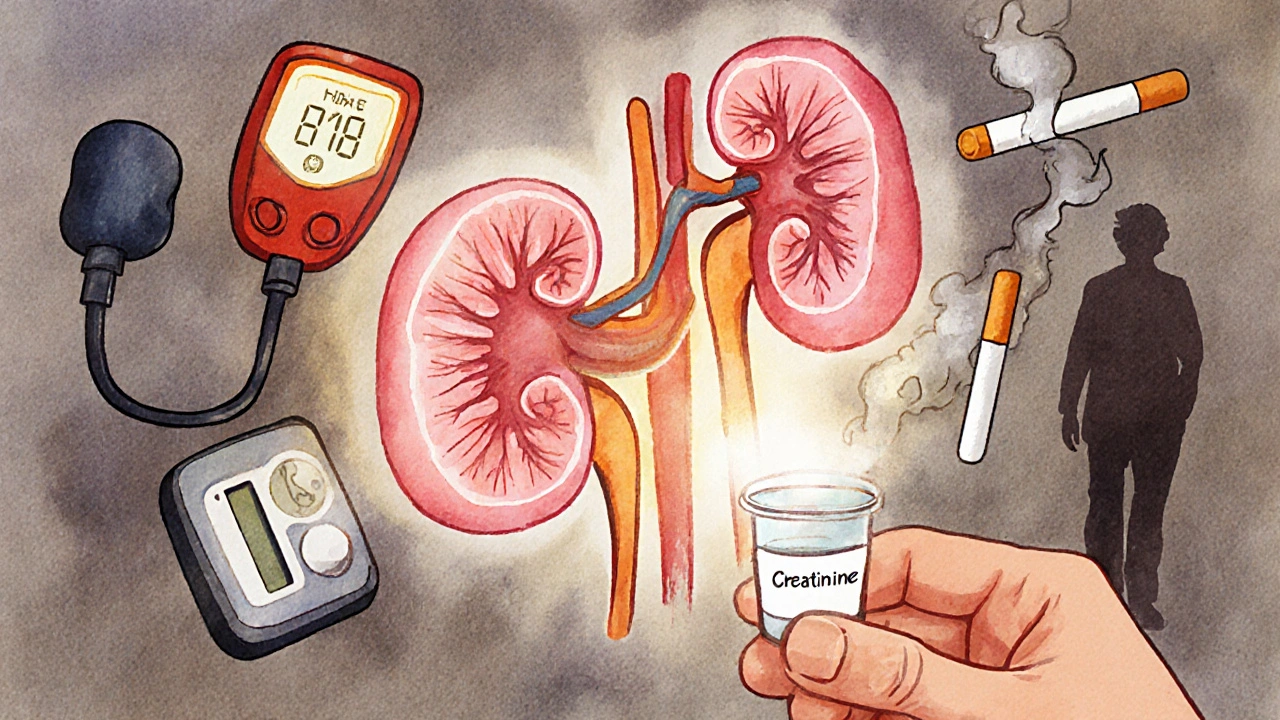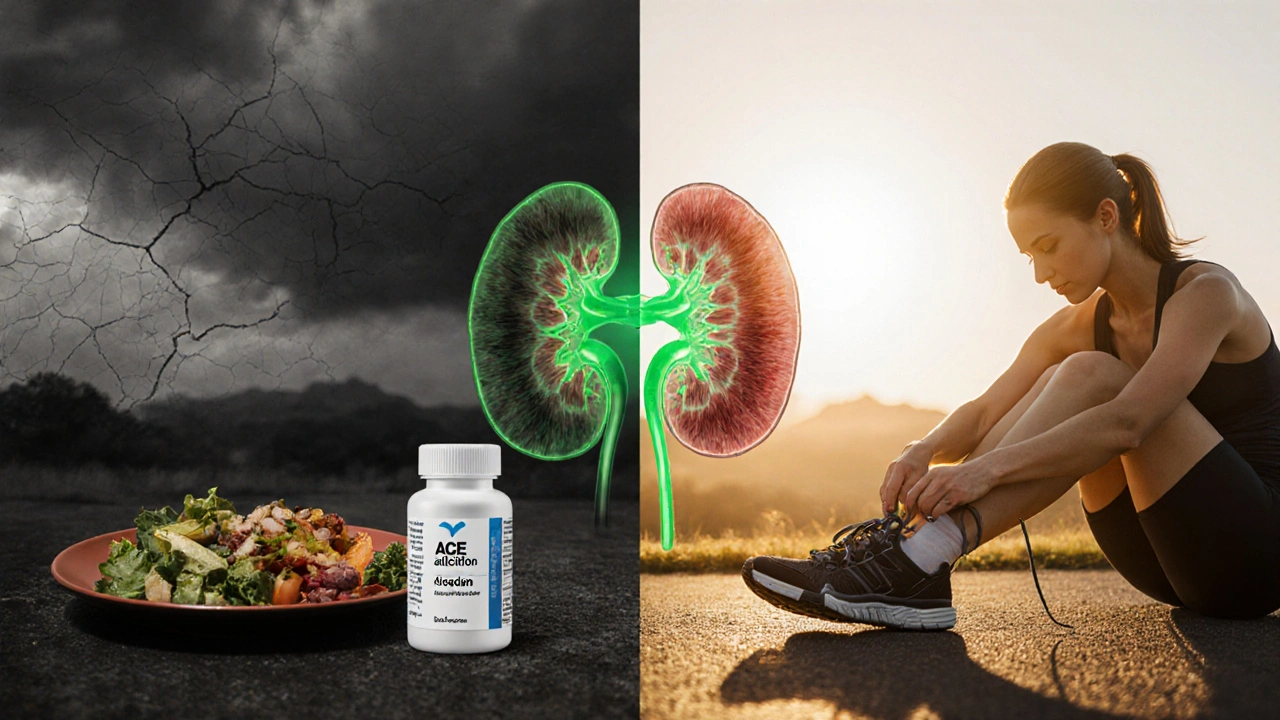Early Detection & Treatment of Kidney Disease: Why It Matters

Kidney Health Risk Calculator
Assess your kidney function based on medical test results. This tool follows clinical guidelines for Chronic Kidney Disease (CKD) staging.
Your Kidney Health Stage
This classification indicates the severity of kidney function.
Risk Assessment
Recommended Actions
Did you know that more than 10% of adults worldwide have some form of kidney disease, yet the majority never realize it until the kidneys are already failing? That silent progression is why catching the problem early can be the difference between a simple medication plan and life‑changing dialysis.
What Is Kidney Disease?
Kidney disease is a broad term that covers any condition that impairs the kidneys' ability to filter waste, balance fluids, and regulate blood pressure. When the damage is progressive it is often labeled as Chronic kidney disease (CKD), a stage‑wise classification that clinicians use to track severity.
Why Early Detection Saves Lives
Research from the World Health Organization shows that early‑stage CKD (stage1‑2) can be managed with lifestyle tweaks and medication, cutting the risk of reaching end‑stage renal disease (ESRD) by up to 70%. In Australia, the Australian Institute of Health and Welfare recorded that patients who began treatment before their eGFR fell below 45mL/min/1.73m² required dialysis an average of 5years later than those diagnosed later.
Key Risk Factors You Should Know
- Diabetes mellitus - high blood sugar damages the tiny blood vessels in the kidneys.
- Hypertension - sustained high pressure forces the kidneys to work harder, leading to scarring.
- Family history of kidney disease.
- Older age (over 60years).
- Smoking and high‑protein diets.
If you have one or more of these factors, consider yourself in the high‑risk group and schedule regular screening.

How to Screen: The Most Reliable Tests
The best way to spot trouble early is by measuring two main indicators: the level of waste products in the blood and the amount of protein leaking into the urine.
| Test | What It Measures | Typical Frequency for High‑Risk Adults | Advantages | Limitations |
|---|---|---|---|---|
| Serum Creatinine & Estimated glomerular filtration rate (eGFR) | Kidney’s filtering capacity | Every 12months | Widely available, cheap | Can be skewed by muscle mass |
| Urine Albumin‑to‑Creatinine Ratio (UACR) | Protein leakage (Albuminuria) | Every 12months | Detects damage before eGFR drops | Requires proper sample collection |
| Blood Pressure Measurement | Hypertension control | Every 6months | Immediate feedback | Doesn't directly measure kidney function |
When these tests are combined, doctors can spot CKD at stage1 or2, well before symptoms appear.
Interpreting the Numbers
- eGFR ≥90mL/min/1.73m² - normal or hyperfiltration; keep monitoring if risk factors exist.
- eGFR 60‑89 - mild reduction; investigate albuminuria.
- eGFR 30‑59 - moderate loss; start renoprotective meds.
- eGFR<30 - severe loss; prepare for specialist referral.
For albuminuria, a UACR < 30mg/g is considered normal, 30‑300mg/g indicates micro‑albuminuria (early damage), and >300mg/g signals macro‑albuminuria (advanced damage).
Early Treatment Options That Really Work
Once a problem is flagged, the goal is to slow progression. Here’s what evidence‑based guidelines recommend:
- Lifestyle changes: Reduce sodium to < 2g/day, limit processed protein, stay hydrated, and exercise 150min/week.
- Blood‑sugar control: Aim for HbA1c<7% if you have diabetes.
- Blood‑pressure targets: Keep it under 130/80mmHg, often achieved with ACE inhibitors or ARBs.
- Stop harmful meds: NSAIDs, certain antibiotics, and contrast dyes can worsen kidney function.
These steps are effective for most patients and can delay the need for dialysis by years.

When to See a Nephrologist
If your eGFR drops below 45mL/min/1.73m², albuminuria exceeds 300mg/g, or you develop complications (e.g., anemia, bone disease), a referral is warranted. Specialists may order a kidney biopsy to pinpoint the exact disease-such as glomerulonephritis-guiding more targeted therapy.
In advanced cases, treatment options expand to dialysis or kidney transplant. Both are life‑sustaining but come with their own trade‑offs, underscoring why preventing progression is far preferable.
Common Myths and Pitfalls
- Myth: “If I feel fine, my kidneys are fine.” - False. Up to 70% of CKD patients are asymptomatic until late stages.
- Myth: “Only seniors get kidney disease.” - Not true; young adults with uncontrolled diabetes develop CKD too.
- Pitfall: Ignoring borderline lab values. A slight dip in eGFR can be an early warning sign; doctors often recommend repeat testing before dismissing it.
Quick Self‑Check Checklist
- Do you have diabetes or hypertension? If yes, schedule a kidney screen.
- Have you had a serum creatinine/eGFR test in the past year?
- Did you check your urine albumin‑to‑creatinine ratio?
- Are you on an ACE inhibitor or ARB? Confirm dosage with your doctor.
- Do you maintain a low‑sodium, balanced‑protein diet?
Cross each item off; if anything is missing, book an appointment. Remember, early detection kidney disease is the first line of defense.
Frequently Asked Questions
What are the first signs of kidney disease?
Most people experience no symptoms early on. The first clues are abnormal lab results-reduced eGFR or the presence of albumin in the urine-often discovered during routine blood work.
How often should a high‑risk adult be screened?
Guidelines recommend at least once a year for adults with diabetes, hypertension, or a family history of CKD. More frequent testing (every 6months) may be needed if earlier results were borderline.
Can diet alone halt kidney disease?
Diet is a key component, especially low sodium and moderated protein, but it works best alongside blood‑pressure control and, when needed, medication. Sole reliance on diet rarely stops progression in moderate‑to‑severe CKD.
Is dialysis the only option once eGFR falls below 15?
Dialysis is the standard when eGFR <15mL/min/1.73m² and symptoms arise, but a kidney transplant remains the preferred long‑term solution for eligible patients. Early referral can expand transplant eligibility.
Do over‑the‑counter NSAIDs damage kidneys?
Yes. Regular NSAID use can reduce blood flow to the kidneys, accelerating damage, especially in people with existing hypertension or diabetes. Opt for acetaminophen when pain relief is needed.
BLAKE LUND
October 14, 2025 AT 15:23Glancing at those eGFR numbers feels like peeking into a secret garden of health.
Veronica Rodriguez
October 18, 2025 AT 05:47Early detection of kidney issues can be a game‑changer; catching a dip in eGFR or a spike in albuminuria lets you and your doctor intervene before irreversible damage sets in 😊. Routine testing, especially for those with hypertension or diabetes, is the cornerstone of proactive care. Lifestyle tweaks-like staying hydrated, moderating protein intake, and managing blood pressure-can preserve kidney function.
Holly Hayes
October 21, 2025 AT 20:11Honestly, the whole notion of a "kidney calculator" feels a tad reductive, as if our complex organ could be summed up in a nifty little widget. Still, the science behind eGFR and albumin‑to‑creatinine ratios is solid, and a quick glance at those numbers can be pretty illuminating. If you’re on the fence, just remember: kidneys are the unsung heroes, silently filtering all day, every day.
Matthew Shapiro
October 25, 2025 AT 10:35That’s a fair point-while tools can’t replace a physician’s judgement, they do empower patients with concrete data. By regularly checking eGFR and UACR, you can spot trends early and discuss them with your healthcare team. It’s a collaborative approach that blends technology with professional expertise.
Julia Phillips
October 28, 2025 AT 23:59Reading about kidney health always pulls at my heartstrings; think of those tiny filters working around the clock, silently shielding us from toxins. When we ignore early warnings, it’s like turning a deaf ear to a cry for help. I’ve seen countless stories where a simple lifestyle change, prompted by early detection, turned a looming crisis into a manageable condition.
Richa Punyani
November 1, 2025 AT 14:23Indeed, the significance of early detection cannot be overstated. A disciplined regimen of regular screenings, coupled with a balanced diet rich in antioxidants, can markedly decelerate disease progression. It is my sincere hope that you adopt these practices with vigor, for the benefit of both present and future well‑being.
Bhupendra Darji
November 5, 2025 AT 04:47Absolutely, I’ll make a note to schedule those labs and keep an eye on my blood pressure. If anyone needs a reminder or wants to share tips on kidney‑friendly meals, feel free to jump in-teamwork makes the dream work!
Robert Keter
November 8, 2025 AT 19:11When one first contemplates the intricate cascade of physiological processes that govern renal filtration, it becomes evident that the kidneys are not merely passive reservoirs of waste disposal but rather dynamic, highly regulated organs orchestrating a symphony of electrolyte balance, fluid homeostasis, and metabolic waste excretion; consequently, any deviation from the normative eGFR range, even if subtle, should prompt a meticulous appraisal of underlying etiologies, ranging from chronic hypertension to insidious glomerulopathies, each bearing its own nuanced therapeutic implications; moreover, the albumin‑to‑creatinine ratio, frequently relegated to a secondary status in lay discussions, serves as a pivotal early biomarker of endothelial dysfunction, heralding the onset of microvascular injury well before overt declines in glomerular filtration manifest clinically; thus, integrating both eGFR and UACR into routine screening protocols, especially for high‑risk cohorts such as individuals with diabetes mellitus, ensures a comprehensive risk stratification that can be leveraged to tailor interventions; lifestyle modifications, while often touted in a cursory fashion, demand a rigorous, patient‑specific approach encompassing dietary sodium restriction, judicious protein consumption, and regular aerobic activity to mitigate glomerular hyperfiltration; pharmacologically, the advent of SGLT2 inhibitors and mineralocorticoid receptor antagonists has revolutionized the therapeutic landscape, offering renoprotective benefits that extend beyond glycemic control; nevertheless, the successful implementation of these strategies hinges upon patient adherence, which is inextricably linked to health literacy and the clarity of physician‑patient communication; therefore, clinicians must prioritize transparent dialogues, utilizing visual aids such as the kidney health calculator to demystify abstract concepts and empower patients to partake actively in their care decisions; in sum, the early detection and nuanced treatment of kidney disease embody a multidimensional paradigm wherein vigilant monitoring, individualized therapy, and collaborative engagement converge to forestall progression, preserve renal function, and ultimately improve quality of life.
Rory Martin
November 12, 2025 AT 09:35While the data looks sound, one must consider the hidden agendas that drive the pharmaceutical industry; selective reporting of eGFR improvements can mask long‑term adverse effects, and the push for widespread testing may serve profit motives more than public health.
Maddie Wagner
November 15, 2025 AT 23:59Let’s keep the focus on practical help: if you notice a dip in your kidney numbers, consult your doctor promptly, discuss potential medication adjustments, and consider supportive measures like a low‑sodium diet and regular exercise. Together we can turn those numbers around.